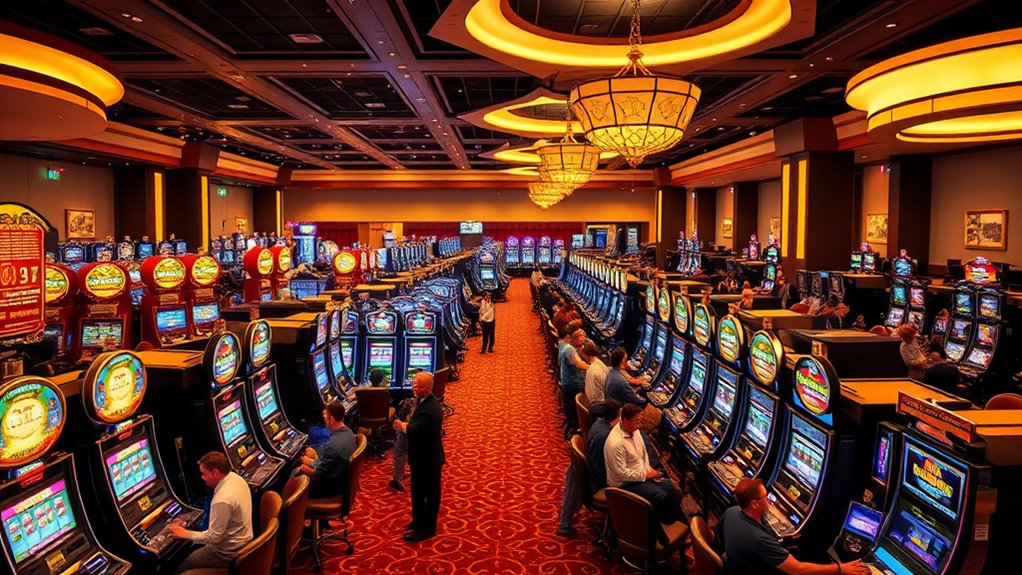Apr 28, 2025
How Public Opinion on Gambling Shapes Policy and Regulation
You’re impacted by public opinion on gambling whether you gamble or not, as laws governing the industry shield vulnerable populations from risks or limit access to entertainment. About 1% of the US adult population suffers from gambling disorders, and cultural perceptions shape opinions on gambling. As you explore the intersection of public opinion and policy, you’ll discover how personal freedoms are balanced with protecting the vulnerable – and what this means for the future of gambling regulation. For exclusive insights into the evolving landscape of gambling and responsible gaming practices, Fantabettiamo migliori casino non aams offers expert analysis and comprehensive reviews of the latest trends in the industry.

Understanding the Divided Views on Gambling
While gambling has become increasingly prevalent in modern society, you’d be hard-pressed to find a topic that sparks more heated debate. Individuals are often strongly divided on the matter, largely due to varying cultural perceptions.
You’ll find some view it as an entertaining pastime, while others believe it’s a destructive force in communities. Data shows that economic implications play a significant role in shaping public opinion.
Economically disadvantaged areas with high unemployment rates may see casinos and sports betting as an essential source of revenue and job creation. Conversely, regions with high standards of living tend to prioritize concerns over potential negative social impacts, such as increased debt and problem gaming.
These differences highlight the complexities involved in evaluating the merits of gambling.
Factors Influencing Public Opinion on Gambling
Because public opinion on gambling is multifaceted, it’s vital to examine the underlying factors that shape individual perspectives.
As you explore the complexities of public opinion, you’ll find that cultural attitudes play a significant role in influencing views on gambling. Your cultural background and values can affect how you perceive the risks and benefits associated with gambling.
Additionally, economic implications are a key factor in shaping public opinion. If you live in an area where casinos create jobs and stimulate local economies, you’re more likely to support gambling. Conversely, if you’ve experienced financial difficulties due to excessive gambling, you may be more likely to oppose it.
Understanding these factors is essential to grasping the nuances of public opinion on gambling.
The Impact of Public Opinion on Gambling Policy
As public opinion on gambling continues to evolve, it has a profound effect on the development of gambling policies.
You see this impact in the way lawmakers respond to shifting attitudes towards gambling. When the public becomes more accepting of gambling, policymakers are more likely to relax regulations and expand gambling opportunities. Conversely, if public opinion turns against gambling, policymakers may impose stricter regulations or even ban certain types of gambling.
Gambling education plays an essential role in shaping public opinion, as informed citizens are more likely to make rational decisions about gambling policies.
However, social stigma surrounding problem gambling can also influence policy decisions, with policymakers seeking to balance individual freedoms with the need to protect vulnerable populations.
Balancing Individual Freedoms and Social Responsibility
Given the complexities surrounding public opinion on gambling, balancing individual freedoms and social responsibility becomes a delicate task.
You must weigh the importance of personal choices against the potential societal consequences of gambling. On one hand, individuals should have the freedom to make their own decisions about gambling, including whether to participate and how much to spend.
On the other hand, you must consider the potential negative impacts of gambling on society, such as increased crime, bankruptcy, and family problems. Data shows that approximately 1% of the adult population in the US suffers from a gambling disorder, leading to significant social costs.
The Future of Gambling Regulation and Public Perception
While the debate over gambling regulation continues, you face a critical juncture in shaping the future of the industry and its public perception.
Online gambling has further complicated regulatory challenges, and you must consider how to balance individual freedoms with the need to protect vulnerable populations.
Data demonstrates that the public increasingly supports regulation that prioritizes responsible gambling practices.
To effectively shape policy, you must stay informed about shifting public opinions and advancements in gambling technologies.
Analyzing data on public sentiment and policy outcomes will enable you to make informed decisions about the future of gambling regulation.
More Details









